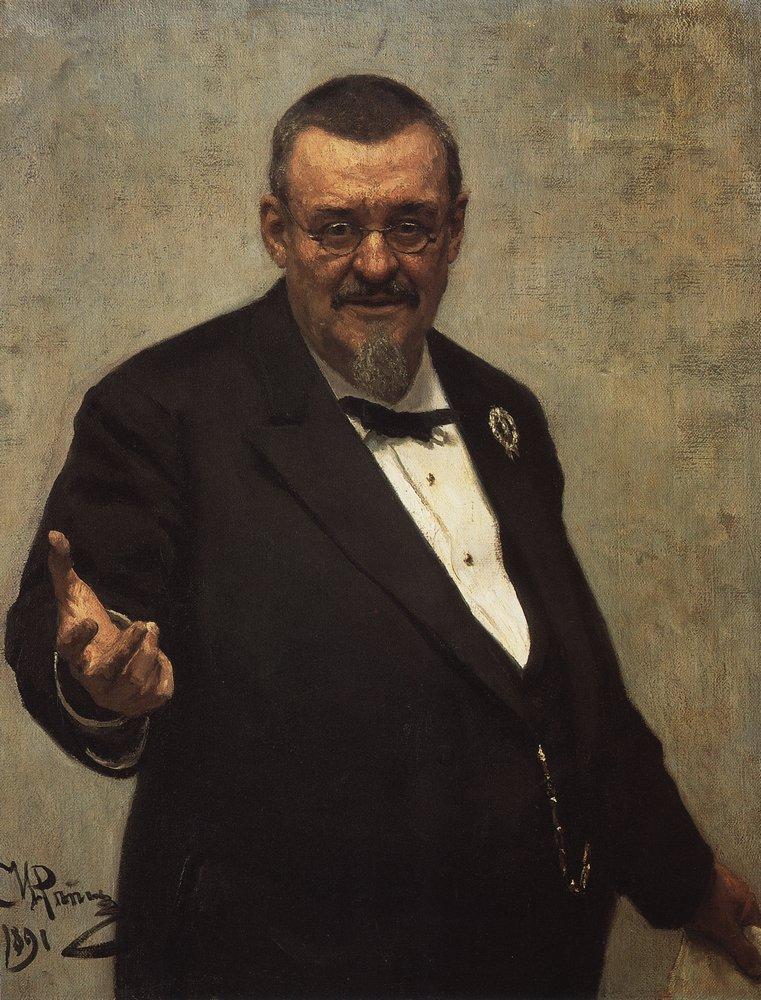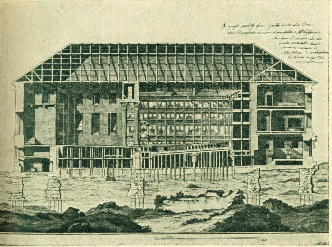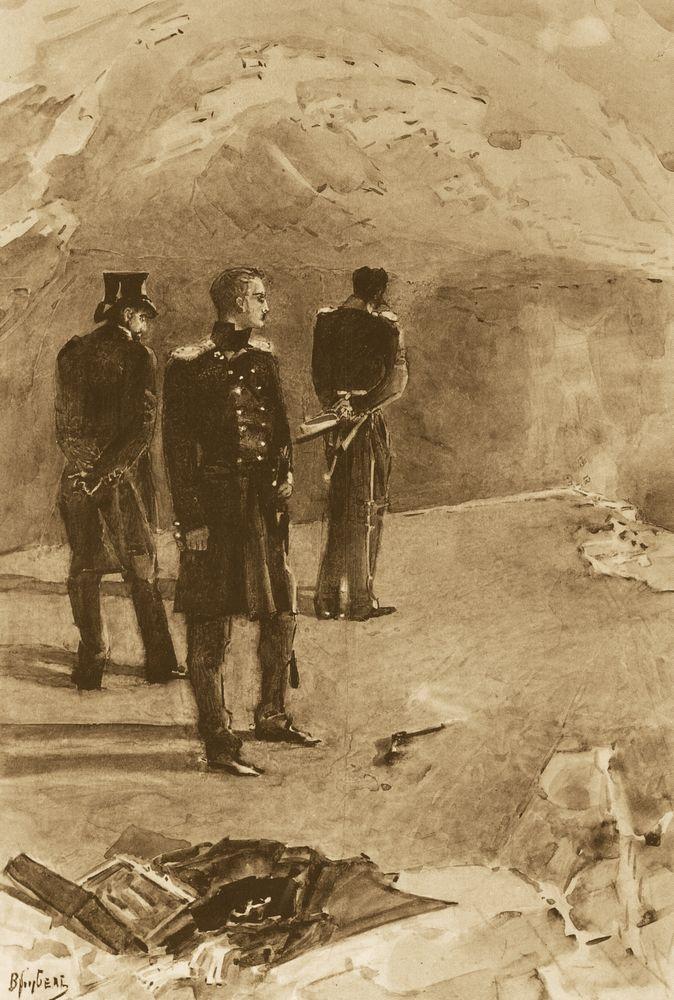|
Alexander Palm
Alexander Ivanovich Palm (Александр Иванович Пальм, , Krasnoslobodsk, Penza Governorate, Russian Empire, - , Saint Petersburg, Russian Empire) was a Russian poet, novelist and playwright, who also used the pseudonym P. Alminsky. A member of the Petrashevsky Circle, Palm in 1847 was arrested, spent 8 months in the Petropavlovsk Fortress, had his death sentence changed to deportation and served 7 years in the Russian Army. Among his best known works are ''Alexey Slobodin. The History of One Family'' (1874, novel) and ''Our Friend Neklyuzhev'' (1879, drama). Biography Alexander Ivanovich Palm was born in Krasnoslobodsk, Penza region, son of a provincial state official and a serf peasant woman. As a teenager he enrolled into the Saint Petersburg military school and after graduation in 1842 joined the Russian Guards as a junior officer. In 1843 his debut poem published by '' Literaturnaya Gazeta'' received praise from critic and playwright Fyodor Koni. In the ... [...More Info...] [...Related Items...] OR: [Wikipedia] [Google] [Baidu] |
Krasnoslobodsk, Republic Of Mordovia
Krasnoslobodsk (russian: Краснослобо́дск; mdf, Ош, ''Oš'') is a town and the administrative center of Krasnoslobodsky District of the Republic of Mordovia, Russia, located on the left bank of the Moksha River (a tributary of the Oka), west of Saransk, the capital of the republic. As of the 2010 Census, its population was 10,151. History It has been known since 1571; town status was granted to it in 1780. Administrative and municipal status Within the framework of administrative divisions, Krasnoslobodsk serves as the administrative center of Krasnoslobodsky District.Law #7-Z As an administrative division, it is incorporated within Krasnoslobodsky District as the town of district significance Town of district significance is an administrative division of a district in a federal subject of Russia. It is equal in status to a selsoviet or an urban-type settlement of district significance, but is organized around a town (as opposed to a ... of Krasno ... [...More Info...] [...Related Items...] OR: [Wikipedia] [Google] [Baidu] |
Włodzimierz Spasowicz
Włodzimierz Spasowicz or Vladimir Spasovich (1829-1906) was a Polish-Russian lawyer often acclaimed as the most brilliant defense attorney of Imperial Russia. Spasovich attended school in Minsk and studied law in St. Petersburg University, where he later became a professor. When the government was persecuting some of his students in 1861, Spasovich resigned his professorship in protest. Two years later, his textbook on criminal law was banned. After the Judicial reform of Alexander II, he emerged as a leading trial lawyer. He took part in many of the sensational political trials of the 1860s and 1870s, including the Nechayev process. Fetyukovich, a defense attorney in Dostoyevsky's ''Brothers Karamazov'', was apparently based on Spasovich. His involvement as defence attorney in the Kroneberg case of 1876 was also discussed in the February section of Dostoyevsky's ''A Writer's Diary ''A Writer's Diary'' (russian: Дневник писателя; ''Dnevnik pisatelya'') is a col ... [...More Info...] [...Related Items...] OR: [Wikipedia] [Google] [Baidu] |
1822 Births
Eighteen or 18 may refer to: * 18 (number), the natural number following 17 and preceding 19 * one of the years 18 BC, AD 18, 1918, 2018 Film, television and entertainment * ''18'' (film), a 1993 Taiwanese experimental film based on the short story ''God's Dice'' * ''Eighteen'' (film), a 2005 Canadian dramatic feature film * 18 (British Board of Film Classification), a film rating in the United Kingdom, also used in Ireland by the Irish Film Classification Office * 18 (''Dragon Ball''), a character in the ''Dragon Ball'' franchise * "Eighteen", a 2006 episode of the animated television series ''12 oz. Mouse'' Music Albums * ''18'' (Moby album), 2002 * ''18'' (Nana Kitade album), 2005 * '' 18...'', 2009 debut album by G.E.M. Songs * "18" (5 Seconds of Summer song), from their 2014 eponymous debut album * "18" (One Direction song), from their 2014 studio album ''Four'' * "18", by Anarbor from their 2013 studio album '' Burnout'' * "I'm Eighteen", by Alice Cooper common ... [...More Info...] [...Related Items...] OR: [Wikipedia] [Google] [Baidu] |
Maly Theatre (Moscow)
Maly Theatre (, literally ''Small Theatre'' as opposed to nearby Bolshoi, or ''Grand'', opera theatre) is a theatre in Moscow, Russia, principally associated with the production of plays. Established in 1806Londre, Margot p. 307 and operating on its present site on the Theatre Square since 1824, the theatre traces its history to the Moscow University drama company, established in 1756. In the 19th century, Maly was "universally recognized in Russia as the leading dramatic theatre of the century", and was the home stage for Mikhail Shchepkin and Maria Yermolova. 40 of Alexander Ostrovsky's 54 plays premiered at Maly, and the theatre was known as The House of Ostrovsky.Londre, Margot p. 306 The Maly Theatre in Moscow and Alexandrinsky Theatre in Saint Petersburg "to a great extent determined the development of Russian theatre during the 19th and 20th century". Maly Theatre positions itself as a traditional drama theatre that produces classical heritage plays. For example, the 200 ... [...More Info...] [...Related Items...] OR: [Wikipedia] [Google] [Baidu] |
Alexandrinsky Theater
The Alexandrinsky Theatre (russian: Александринский театр) or National Drama Theatre of Russia is a theatre in Saint Petersburg, Russia. The Alexandrinsky Theatre was built for the Imperial troupe of Petersburg (Imperial troupe was founded in 1756). Since 1832, the theatre has occupied an Empire-style building that Carlo Rossi designed. It was built in 1828–1832 on Alexandrinsky Square (now Ostrovsky Square), which is situated on Nevsky Prospekt between the National Library of Russia and Anichkov Palace. The theatre was opened on 31 August (12 September) 1832. The theatre and the square were named after Empress consort Alexandra Feodorovna. The building is part of the UNESCO World Heritage Site Historic Centre of Saint Petersburg and Related Groups of Monuments. It was one of the many theatres of the Imperial troupe. Dramas, operas and ballets were on the stage. Only in the 1880s, the theatre has become dramatic and tragedy filled. The premières of n ... [...More Info...] [...Related Items...] OR: [Wikipedia] [Google] [Baidu] |
Fyodor Dostoyevsky
Fyodor Mikhailovich Dostoevsky (, ; rus, Фёдор Михайлович Достоевский, Fyódor Mikháylovich Dostoyévskiy, p=ˈfʲɵdər mʲɪˈxajləvʲɪdʑ dəstɐˈjefskʲɪj, a=ru-Dostoevsky.ogg, links=yes; 11 November 18219 February 1881), sometimes transliterated as Dostoyevsky, was a Russian novelist, short story writer, essayist and journalist. Dostoevsky's literary works explore the human condition in the troubled political, social, and spiritual atmospheres of 19th-century Russia, and engage with a variety of philosophical and religious themes. His most acclaimed novels include ''Crime and Punishment'' (1866), ''The Idiot'' (1869), ''Demons'' (1872), and ''The Brothers Karamazov'' (1880). His 1864 novella, ''Notes from Underground'', is considered to be one of the first works of existentialist literature. Numerous literary critics regard him as one of the greatest novelists in all of world literature, as many of his works are considered highly influen ... [...More Info...] [...Related Items...] OR: [Wikipedia] [Google] [Baidu] |
Vestnik Evropy
''Vestnik Evropy'' (russian: Вестник Европы) (''Herald of Europe'' or ''Messenger of Europe'') was the major liberal magazine of late-nineteenth-century Russia. It was published from 1866 to 1918. The magazine (named for an earlier publication edited by Nikolay Karamzin) was founded by Mikhail Matveevich Stasyulevich, a former professor of history, who remained the publisher-editor until 1909; its editorial office "was located in Stasyulevich's flat at 20 Galernaya Street and was one of the centres of St. Petersburg's cultural and political life (the journal's major contributors as well as their friends and associates used to get together on Wednesdays)."Saint Petersburg Encyclopedia entry The first issue appeared in March 1866; for the first two years it was a hist ... [...More Info...] [...Related Items...] OR: [Wikipedia] [Google] [Baidu] |
A Hero Of Our Time
''A Hero of Our Time'' ( rus, Герой нашего времени, links=1, r=Gerój nášego vrémeni, p=ɡʲɪˈroj ˈnaʂɨvə ˈvrʲemʲɪnʲɪ) is a novel by Mikhail Lermontov, written in 1839, published in 1840, and revised in 1841. It is an example of the superfluous man novel, noted for its compelling Byronic hero (or antihero) Pechorin and for the beautiful descriptions of the Caucasus. There are several English translations, including one by Vladimir Nabokov and Dmitri Nabokov in 1958. Grigory Alexandrovich Pechorin Pechorin is the embodiment of the Byronic hero. Byron's works were of international repute and Lermontov mentions his name several times throughout the novel. According to the Byronic tradition, Pechorin is a character of contradiction. He is both sensitive and cynical. He is possessed of extreme arrogance, yet has a deep insight into his own character and epitomizes the melancholy of the Romantic hero who broods on the futility of existence and the ce ... [...More Info...] [...Related Items...] OR: [Wikipedia] [Google] [Baidu] |
The Song Of The Merchant Kalashnikov
A Song about Tsar Ivan Vasilyevich, the Young Oprichnik, and the Valorous Merchant Kalashnikov (Russian: Песня про царя Ивана Васильевича, молодого опричника и удалого купца Калашникова), often abbreviated as ''The Song of the Merchant Kalashnikov'', is a poem by Mikhail Lermontov written in 1837 and first published in 1838. The plot of the poem is set during Oprichnina times. Rhythmically, ''Kalashnikov'' is patterned after ''bylina'', the Russian folk epic. Its most famous scene describes a fistfight between the protagonists, Kalashnikov and oprichnik Kiribeevich. Plot The first scene of the poem describes a banquet at the Tsar's palace. Ivan The Terrible is strictly watching his Boyars and Oprichniki and suddenly notices that the young Oprichnik named Kiribeevich doesn't eat or drink anything and doesn't seem to enjoy the feast. When asked for a reason, Kiribeevich tells the Tsar that he fell in love with a g ... [...More Info...] [...Related Items...] OR: [Wikipedia] [Google] [Baidu] |
Mikhail Lermontov
Mikhail Yuryevich Lermontov (; russian: Михаи́л Ю́рьевич Ле́рмонтов, p=mʲɪxɐˈil ˈjurʲjɪvʲɪtɕ ˈlʲɛrməntəf; – ) was a Russian Romantic writer, poet and painter, sometimes called "the poet of the Caucasus", the most important Russian poet after Alexander Pushkin's death in 1837 and the greatest figure in Russian Romanticism. His influence on later Russian literature is still felt in modern times, not only through his poetry, but also through his prose, which founded the tradition of the Russian psychological novel. Biography Mikhail Yuryevich Lermontov was born in Moscow into the respectable noble family of Lermontov, and he grew up in the village of Tarkhany (now Lermontovo in Penza Oblast). His paternal family descended from the Scottish family of Learmonth, and can be traced to Yuri (George) Learmonth, a Scottish officer in the Polish–Lithuanian service who settled in Russia in the middle of the 17th century. He had been captur ... [...More Info...] [...Related Items...] OR: [Wikipedia] [Google] [Baidu] |
Alexey Pleshcheyev
Aleksey Nikolayevich Pleshcheyev (russian: link=no, Алексе́й Никола́евич Плеще́ев; 8 October 1893) was a radical Russian poetry, Russian poet of the 19th century, once a member of the Petrashevsky Circle. Pleshcheyev's first book of poetry, published in 1846, made him famous: "Step forward! Without fear or doubt..." became widely known as "a Russian ''La Marseillaise''" (and was sung as such, using French melody), "Friends' calling..." and "We're brothers by the way we feel..." were also adopted by the mid-1840s' Russian radical youth as revolutionary hymns. In 1849, as a member of Petrashevsky Circle, Pleshcheyev was arrested, sent (alongside Fyodor Dostoyevsky among others) to Saint Petersburg and spent 8 months in Peter and Paul Fortress. Having initially been given a death sentence, Pleshcheyev was then deported to Uralsk, near Orenburg where he spent ten years in exile, serving first as a soldier, later as a junior officer. In his latter life, Pl ... [...More Info...] [...Related Items...] OR: [Wikipedia] [Google] [Baidu] |
Novoye Vremya (newspaper)
''Novoye Vremya'' ( rus, Но́вое вре́мя, p=ˈnovəjə ˈvrʲemʲə) was a Russian newspaper published in St. Petersburg from 1868 to 1917. Until 1869 it came out five times a week; thereafter it came out every day, and from 1881 there were both morning and evening editions. In 1891 a weekly illustrated supplement was added. The newspaper began as a liberal publication, and in 1872 published an editorial celebrating the appearance in Russian of the first volume of Karl Marx's ''Das Kapital'', but after Aleksey Suvorin took it over it acquired a reputation as a servile supporter of the government, in part because of the antisemitic and reactionary articles of Victor Burenin. "'The motto of Suvorin's ''Novoye Vremya'',' wrote Russia's greatest satirist Mikhail Saltykov-Shchedrin, Saltykov-Shchedrin, 'is to go inexorably forward, but through the anus.'" Nevertheless, it became one of Russia's most popular newspapers, with a circulation reaching 60,000 copies, and published ... [...More Info...] [...Related Items...] OR: [Wikipedia] [Google] [Baidu] |





